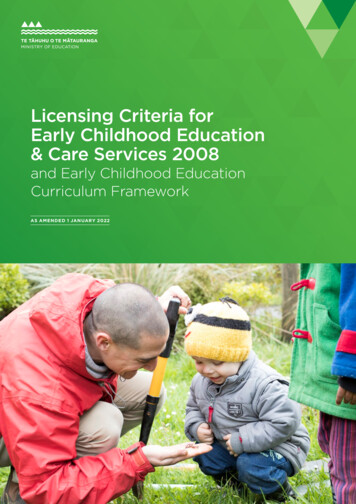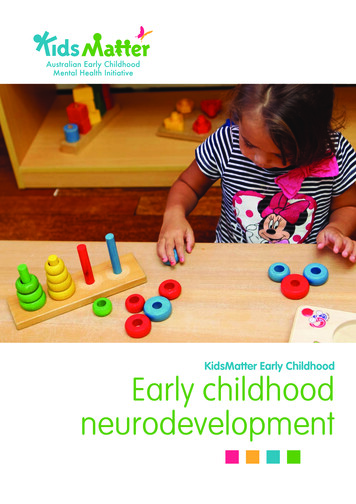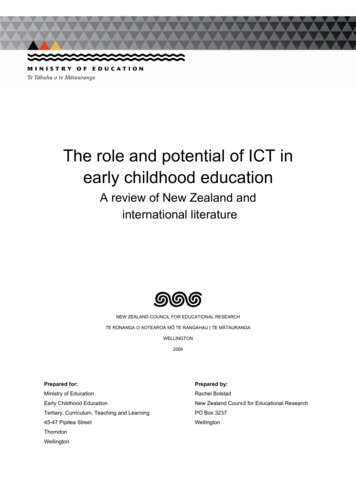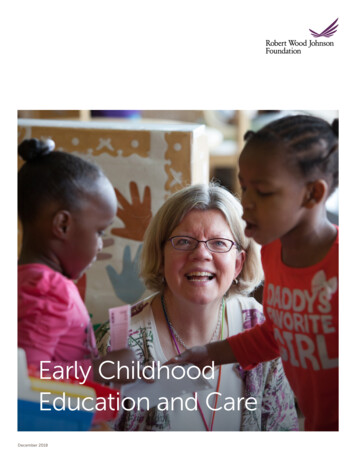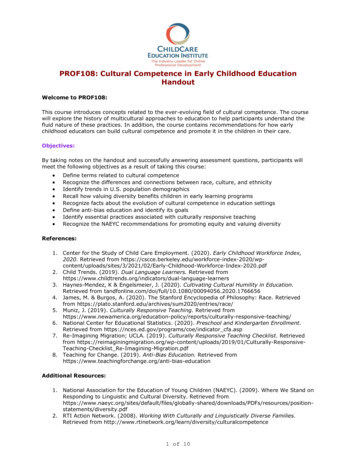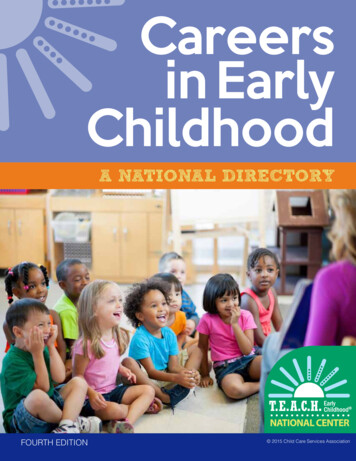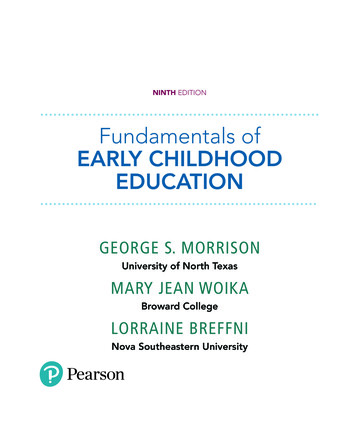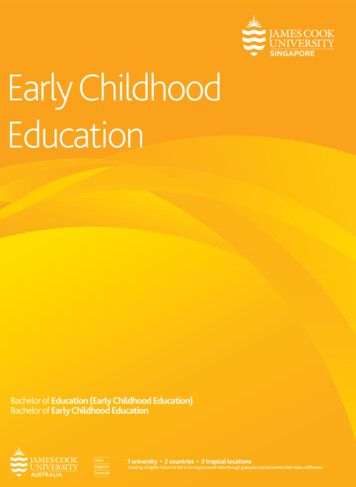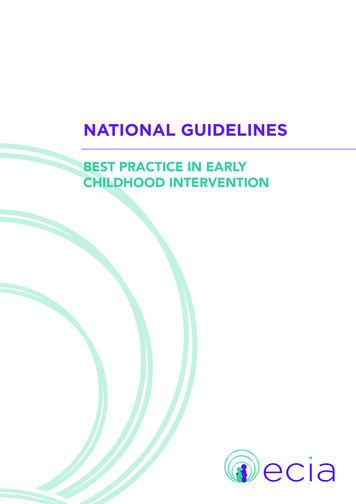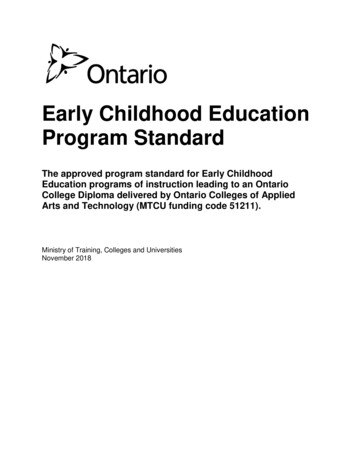
Transcription
Early Childhood EducationProgram StandardThe approved program standard for Early ChildhoodEducation programs of instruction leading to an OntarioCollege Diploma delivered by Ontario Colleges of AppliedArts and Technology (MTCU funding code 51211).Ministry of Training, Colleges and UniversitiesNovember 2018
AcknowledgementsThe Ministry of Training, Colleges and Universities acknowledges with thanks thesignificant contribution of the many individuals and organizations which participated inthe development of this program standard. In particular, the Ministry of Training,Colleges and Universities would like to acknowledge the important roles of all individuals and organizations which participated in the consultationsthe faculty, coordinators and deans of the Early Childhood Education (OntarioCollege Diploma) programs for their assistance throughout the projectChristine Foster, the Project Officer who led the development of the Englishvocational learning outcomes and Louise Campagna, the Project Officer who led theFrench review.
Table of contentsEarly Childhood Education Program Standard . 1Acknowledgements . 2Table of contents . 3Introduction . 1Development of system-wide program standards .1Program standards .1The expression of program standards as vocational learning outcomes .2The presentation of the vocational learning outcomes .2The development of a program standard .2Updating the program standard .3Vocational standard . 4Preamble.4Early Childhood Education (Ontario College Diploma) .6The vocational learning outcomes .8Glossary .21Essential employability skills . 25Context .25Skill categories .25Application and implementation .26General education requirement . 28Requirement .28Purpose .28
IntroductionThis document is the Program Standard for the Early Childhood Education programs ofinstruction leading to an Ontario College Diploma delivered by Ontario Colleges ofApplied Arts and Technology (MTCU funding code 51211).Development of system-wide program standardsIn 1993, the Government of Ontario initiated program standards development with theobjectives of bringing a greater degree of consistency to college programming offeredacross the province, broadening the focus of college programs to ensure graduateshave the skills to be flexible and to continue to learn and adapt, and providing publicaccountability for the quality and relevance of college programs.The Program Standards Unit of the Ministry of Training, Colleges and Universities hasresponsibility for the development, review and approval of system-wide standards forprograms of instruction at Ontario Colleges of Applied Arts and Technology.Program standardsProgram standards apply to all similar programs of instruction offered by collegesacross the province. Each program standard for a postsecondary program includes thefollowing elements: Vocational standard (the vocationally specific learning outcomes which apply tothe program of instruction in question),Essential employability skills (the essential employability skills learningoutcomes which apply to all programs of instruction); andGeneral education requirement (the requirement for general education inpostsecondary programs of instruction).Collectively, these elements outline the essential skills and knowledge that a studentmust reliably demonstrate in order to graduate from the program.Individual Colleges of Applied Arts and Technology offering the program of instructiondetermine the specific program structure, delivery methods and other curriculummatters to be used in assisting students to achieve the outcomes articulated in thestandard. Individual colleges also determine whether additional local learning outcomeswill be required to reflect specific local needs and/or interests.1
The expression of program standards as vocationallearning outcomesVocational learning outcomes represent culminating demonstrations of learning andachievement. They are not simply a listing of discrete skills, nor broad statements ofknowledge and comprehension. In addition, vocational learning outcomes areinterrelated and cannot be viewed in isolation from one another. As such, they shouldbe viewed as a comprehensive whole. They describe performances that demonstratethat significant integrated learning by graduates of the program has been achieved andverified.Expressing standards as vocational learning outcomes ensures consistency in theoutcomes for program graduates, while leaving to the discretion of individual colleges,curriculum matters such as the specific program structure and delivery methods.The presentation of the vocational learning outcomesThe vocational learning outcome statements set out the culminating demonstration oflearning and achievement that the student must reliably demonstrate before graduation.The elements of the performance for each outcome define and clarify the level andquality of performance necessary to meet the requirements of the vocational learningoutcome. However, it is the performance of the vocational learning outcome itself onwhich students are evaluated. The elements of performance are indicators of the meansby which the student may proceed to satisfactory performance of the vocational learningoutcome. The elements of performance do not stand alone but rather in reference to thevocational learning outcome of which they form a part.The development of a program standardIn establishing the standards development initiative, the Government determined that allpostsecondary programs of instruction should include vocational skills coupled with abroader set of essential skills. This combination is considered critical to ensuring thatcollege graduates have the skills required to be successful both upon graduation fromthe college program and throughout their working and personal lives.A program standard is developed through a broad consultation process involving arange of stakeholders with a direct interest in the program area, including employers,professional associations, universities, secondary schools and program graduatesworking in the field, in addition to students, faculty and administrators at the collegesthemselves. It represents a consensus of participating stakeholders on the essentiallearning that all program graduates should have achieved.2
Updating the program standardThe Ministry of Training, Colleges and Universities will undertake regular reviews of thevocational learning outcomes for this program to ensure that the Early ChildhoodEducation Program Standard remains appropriate and relevant to the needs of studentsand employers across the Province of Ontario. To confirm that this document is themost up-to-date release, please contact the Ministry of Training, Colleges andUniversities.3
Vocational standardAll graduates of Early Childhood Education programs have achieved the ten vocationallearning outcomes (VLOs), in addition to achieving the essential employability outcomesand meeting the general education (GE) requirement.PreambleThe Early Childhood Education diploma program prepares graduates to work as earlychildhood educators with children* aged 0-12 years and their families*. Graduates findemployment in a range of early years and child care* settings including centre-basedand home-based child care, child and family programs (e.g., EarlyON child and familycentres), schools (full day kindergarten, before and after school programs in public andprivate schools), and children’s* services (e.g., supports for children with specialneeds*, children’s* mental health services and early intervention programs).Early childhood education is a regulated profession governed by the Early ChildhoodEducators Act, 2007 and regulated by the College of Early Childhood Educators(CECE). Registration with the College of Early Childhood Educators as a RegisteredEarly Childhood Educator (RECE) is required for practice in the province of Ontario.Graduates of the Early Childhood Education program create learning contexts that buildand maintain caring, responsive relationships* and partnerships with children*,families* and communities that respect diverse* cultural and linguistic backgroundsincluding Indigenous* peoples’ worldviews and Francophone identity. Graduatesacknowledge that there is variability among children* while identifying circumstanceswhere children* and families* may require additional support or referral to communityresources to support holistic development* and optimal learning and well-being.Working from the view of children*, families* and educators as competent, capable,curious and rich in potential and experience, graduates co-create, facilitate and reflectupon programs and pedagogical* approaches to support children’s* learning andholistic development*. Graduates co-create inquiry and play-based* early learningopportunities to ensure all children* have a sense of belonging, well-being,engagement, and opportunities to express their ideas and responses. Graduatescapitalize on spontaneous events to support child-led learning and to promotemeaningful early learning environments* that build on children’s* curiosity andimagination. Graduates reflect on and revise early learning curriculum* and programsusing pedagogical documentation* as a means of communication and reflection abouthow children* think and learn.Graduates co-design and maintain safe, healthy and inclusive* early learningenvironments* that support equitable and accessible learning opportunities forchildren* with diverse abilities, interests and ideas, and their families*. Graduatescreate partnerships through professional communication and collaboration with4
families*, colleagues, multi-disciplinary professionals, authorities and child serviceagencies to promote and advocate* for quality early learning and child care programsand services.Graduates have knowledge of current legislation related to early learningenvironments* and can relate regulations to current policies and procedures in earlyyears and child care* settings. They recognize the interconnection of governinglegislation, code of ethics, professional practice standards, and administrativeresponsibilities to provide support and guidance to children* and their families*.Graduates recognize the importance of the protection of children* and identify, reportand document when a child is at a perceived risk for abuse or neglect in accordancewith the College of Early Childhood Educators Code of Ethics and Standards ofPractice, legislation, policies and procedures.Graduates of the Early Childhood Education program base their work with children*and families* on relevant pedagogy*, theories and evidence-informed practices*,making informed decisions based on their professional knowledge and judgement. Coreprofessional values of accountability, caring, respect, trustworthiness and integrityenable graduates to formally recognize their commitment to children*, families*,colleagues and the community, and to the profession of early childhood education.Graduates are prepared to engage in collaborative inquiry* and reflective practice*.They commit to ongoing professional learning and recognize that all early childhoodeducators are leaders regardless of their role or position in early years and child care*settings.Graduates are aware of the need to responsibly address ethical dilemmas that arisewhen working in early years and child care* settings and apply ethical andprofessional standards* in accordance with the current College of Early ChildhoodEducators Code of Ethics and Standards of Practice.There are opportunities for graduates to pursue further educational qualifications anddegree completion. Graduates should contact individual colleges for further details.*See GlossaryNote: The Ontario Council on Articulation and Transfer (ONCAT) maintains theprovincial postsecondary credit transfer portal, ONTransfer.5
Synopsis of the vocational learning outcomesEarly Childhood Education (Ontario College Diploma)The graduate has reliably demonstrated the ability to:1. create learning contexts to enable, build and maintain caring, responsiverelationships* in partnerships with children*, families* and communities thatvalue and respect social, cultural and linguistic diversity* including Indigenous*peoples’ worldviews and Francophone identity.2. co-create, facilitate and reflect upon inquiry and play-based* early years and childcare* programs and pedagogical* approaches to support children’s* learning,holistic development* and well-being following children’s* capabilities, interests,ideas and experiences.3. co-design and maintain inclusive* early learning environments* to value andsupport equitable, accessible and meaningful learning opportunities for all children*,their families* and communities in a range of early years and child care* settings.4. collaborate with children*, families*, colleagues, agencies and community partnersto create, maintain, evaluate and promote safe and healthy early learningenvironments* to support independence, reasonable risk-taking and healthydevelopment and well-being.5. use observation strategies* to identify children’s* strengths and challenges and toascertain when children* and families* might benefit from additional support orcommunity resources.6. use professional communication in interactions with children*, families*,colleagues, employers, the regulatory body*, government authorities andchildren’s* service agencies to meet legal and ethical standards of the early yearssector*.7. act in accordance with relevant legislation, regulations, College of Early ChildhoodEducators Code of Ethics and Standards of Practice, agency policies andprocedures and principles of evidence-informed practice* and reflect* upon theirimpact on one’s own role in early years and child care* settings.8. identify, report and document when a child is in a situation of perceived risk for, oractual neglect or abuse, in accordance with legislation, the College of EarlyChildhood Educators Code of Ethics and Standards of Practice, policies andprocedures.9. create and engage in partnerships with families*, communities, colleagues, interdisciplinary professionals, authorities and child service agencies to advocate forquality early years and child care* programs and services.6
10. engage in reflective practice* and continuous professional learning* inaccordance with principles of lifelong learning, evidence-informed practices* in theearly years sector* and requirements of the College of Early Childhood Educators.VLO 11 below is specific to ECE Diploma programs that are known as Indigenous*Early Childhood Education Programs (MTCU Code 51211). Graduates of theseprograms have reliably demonstrated Vocational Outcomes 1-10 in addition to VLO 11.11. engage with Indigenous* children*, families* and communities to co-create,implement and evaluate Indigenous* early years and child care* and child andfamily programs and environments that are culturally* sensitive and culturally*relevant to the communities they serve.*See GlossaryNote: The learning outcomes have been numbered as a point of reference; numberingdoes not imply prioritization, sequencing, nor weighting of significance.7
The vocational learning outcomes1. The graduate has reliably demonstrated the ability to: create learning contexts toenable, build and maintain caring, responsive relationships* in partnerships withchildren*, families* and communities that value and respect social, cultural andlinguistic diversity* including Indigenous* peoples’ worldviews and Francophoneidentity.Elements of the performancea. acknowledge and engage in caring and responsive relationships* with children*,their families* and communities as fundamental to early childhood educationpracticeb. view children* and families* as capable, competent, curious and rich in potentialand experiencesc. discuss the professional duty that early childhood educators have to develop caringresponsive relationships* with children*, families* and communities within therequirements of the profession’s regulatory* frameworkd. respect and honour the uniqueness and diversity* of children*, families* andcommunities including family* structure, language, cultural values and practices,ethnicity, socio-economic status, spirituality, gender age and sexual orientatione. respect and honour the uniqueness and diversity* within Indigenous* families*including the integral role of extended family*, community and relationship with thenatural and spiritual worldf. work with families* and communities to support the transmission of language andculture*g. recognize and value the capacity and abilities that families* bring to the earlylearning partnershiph. provide the space and opportunity for Indigenous* peoples to discuss the impact ofcolonization experiences on their families* and communitiesi. initiate supportive and respectful interactions with children* and families* fromimmigrants or refugee communities recognizing the impact of experiences such aswar, violence, trauma or separationj. establish partnerships with families* to promote engagement in children’s* earlylearningk. identify the valuable input that families* contribute as experts and as first teachers,in their children’s* abilities, interests and ideasl. integrate and reflect on the unique strengths and contributions of families* andcommunities into programs and support their sense of belonging and partnershipm. offer and support families* through the sharing of knowledge and communityresourcesn. support connections between Indigenous* families*, communities andIndigenous* culture*o. share children's* ongoing development with families*p. promote competence, resiliency and positive self-esteem in children* and families*q. model respectful relationships which are trustworthy and inclusive*8
r. support healthy social and emotional development in children*s. engage with children* to model and support their successful interactions in groupsand to develop their sense of belonging and connectednesst. engage children* and families* in reflection on learning to develop insight and buildon learningu. support children* in developing internally motivated strategies for self-regulation*v. support children* and family* transitions between daily routines*See Glossary9
2. The graduate has reliably demonstrated the ability to: co-create, facilitate and reflectupon inquiry and play-based* early years and child care* programs andpedagogical* approaches to support children’s* learning, holistic development*and well-being following children’s* capabilities, interests, ideas and experiences.Elements of the performancea. observe children* to understand, respond to and extend upon their learninginterests and approach to learningb. analyze a variety of current child learning theories and pedagogical* approachesc. apply principles and practices of early learning pedagogy* to programdevelopment, across a range of early learning and child care programs includingchild care, kindergarten, before and after school and child and family programs,and in accordance with current provincial curriculum* guidelines orprogram/pedagogical documents*d. integrate pedagogical* approaches to support the foundations of learning intoprogram planning, (i.e., goals of children’s* well-being, engagement, belongingand expressione. incorporate learning throughout all activities of the day including learningopportunities in outdoor settings that foster an understanding and appreciationfor the natural environmentf. co-create and interact with children* in early learning environments* and spacesthat encourage investigation, imagination, creativity and problem solving andrecognize children* as competent, capable, curious and rich in experienceg. co-create learning environments where families* participate as co-learners and coplanners with children* in programs and spontaneous learning opportunitiesh. use a variety of strategies to support learning through inquiry and play-based*experiences and provide rationale for pedagogical decision-makingi. co-create and reflect upon early learning opportunities to foster the developmentand appreciation of creative arts, including music, dance, visual, dramatic andliterary artsj. co-create and use a broad range of open-ended materials that scaffold learningand support investigation, creativity and problem solving in children*k. identify with children* and families* ways that learning can be extended athomel. engage in pedagogical documentation* processes to make children’s* thinkingand learning visible, e.g., digital/electronic platforms, documentation panels,portfolios and learning storiesm. share pedagogical documentation* with children*, families* and colleagues toencourage reflection* and co-learning or discovery of meaning underlyingchildren’s* experiencesn. reflect upon early learning programs based on observation and analysis ofchildren’s* engagement and level of participation with learning materials,environment, self and otherso. interact with children* to observe their emerging abilities, interests and ideas andadapt programs to optimize children’s* holistic development* and learning10
p. use observation strategies* and reflection to determine if children’s*abilities, interests and ideas are acknowledgedq. collaborate with others in the co-creation, implementation and evaluation of inquiryand play-based* learning strategies in a variety of early years and child care*settingsr. communicate with families* the benefits of inclusive*, inquiry and play-based*early learning opportunities*See Glossary11
3. The graduate has reliably demonstrated the ability to: co-design and maintaininclusive* early learning environments* to value and support equitable,accessible and meaningful learning opportunities for all children*, their families*and communities in a range of early years and child care* settings.Elements of the performancea. provide a welcoming and nurturing environment for all children* and their families*b. promote a sense of belonging and acceptance in all children* and their families*,including children with special needs*, within a range of early years and childcare* settingsc. discuss the concept of the environment as a “third teacher”d. co-design inclusive* early learning environments* with colleagues,children* their families* and communities that ensure full participation of allchildren* considering ability, cultural and linguistic diversity, sexual identity,socioeconomic diversity, spirituality, religious affiliation, refugee status orIndigenous* identitye. foster inclusive* learning environments that allow all children* and families* toparticipate in ways that are meaningful and recognize individual abilities andapproaches to learningf. support relationships with and between children* and families* from diverse*communities to create inclusive* early learning environments*g. support the development and learning of children* within the context of theirfamily*, culture* and communityh. establish early learning environments* that welcome and engage all children*and create the conditions to support meaningful relationships among children*colleagues and families*i. co-design, set up and modify the physical, social and emotional environment tosupport all children’s* ongoing holistic development* and learning, includingchildren with special needs*j. provide learning materials and opportunities that are culturally appropriate andauthentick. provide flexibility and choice in learning materials and opportunities to optimizeholistic development* and learning for all children* and their families*l. apply principles of universal design in learning to the development of learningmaterials and opportunitiesm. select and use appropriate technology and assistive technology tools to optimize allchildren’s* learning and holistic development*n. apply current regulations of the Accessibility for Ontarians with Disabilities Act(AODA) 2005, to early years and child care* settingso. identify community partnerships and resources to support inclusive environmentsp. work with others, using observation strategies* and reflection*, to evaluateinclusive* practices in a variety of early years and child care* settingsq. contribute to an early learning culture* that reflects on current practices andpromotes quality inclusion* practices in early years and child care* settings*See Glossary12
4. The graduate has reliably demonstrated the ability to: collaborate with children*,families*, colleagues, agencies and community partners to create, maintain,evaluate and promote safe and healthy early learning environments* to supportindependence, reasonable risk-taking and healthy development and well-being.Elements of the performancea. plan and provide healthy and safe indoor and outdoor environments andprogramming in accordance with current legislation, guidelines and agency/schoolboard policyb. use current evidence-informed* methods to monitor, evaluate and ensure earlylearning environments* are healthy, safe and of high-qualityc. act in accordance with health and safety requirements outlined in the Child Care andEarly Years Act, 2014d. facilitate children’s* efforts to take reasonable risks, test limits and gainindependence and self-confidencee. co-develop strategies to ensure sufficient time for safe and supportive transitions indaily routines while maintaining supervision at all timesf. consult and plan with families* and relevant professionals to incorporate family*and cultural* preferences that promote and support nutritional healthg. identify children’s* relevant health information, including but not limited to medicalconditions, special needs*, allergies, medication requirements and emergencycontact informationh. collaborate with families* to meet specific health needs of children*i. support the development of children’s* physical and mental health and well-beingby promoting healthy patterns of eating, physical activity, sleep and personal carej. interpret and apply regulations of the Occupational Health and Safety Act, 1990 toearly years and child care* settingsk. observe and monitor early learning environments* and take action to avoidexposing children* to harmful or unsafe situationsl. plan and adapt practices to enhance safety and accessibility for children* andothers in the learning environmentm. respond appropriately to emergency situations following provincial and/or municipalrequirements, and agency/school board policies and proceduresn. report and record all accidents or incidents noting strategies to reduce risk andprevent future incidentso. create opportunities for children’s* and families’* learning and support related tohealth promotion, environmental hazards and safety practices*See Glossary13
5. The graduate has reliably demonstrated the ability to: use observation strategies*to identify children’s* strengths and challenges and to ascertain when children*and families* might benefit from additional support or community resources.Elements of the performancea. identify and value the variations that occur in children’s* development, abilities andinterestsb. select and use data collection strategies and tools that are without bias and that arelinguistically and culturally appropriate for children*c. obtain family* consent for the collection and use of children’s* information andcomply with all privacy legislation and policies for information sharingd. identify and share with families*, the purpose and process for the collection ofinformation rega
Early childhood education is a regulated profession governed by the . Early Childhood Educators Act, 2007 and regulated by the College of Early Childhood Educators (CECE). Registration with the College of Early Childhood Educators as a Registered Early Childhood Educator (RECE) is required for practice in the province of Ontario.
